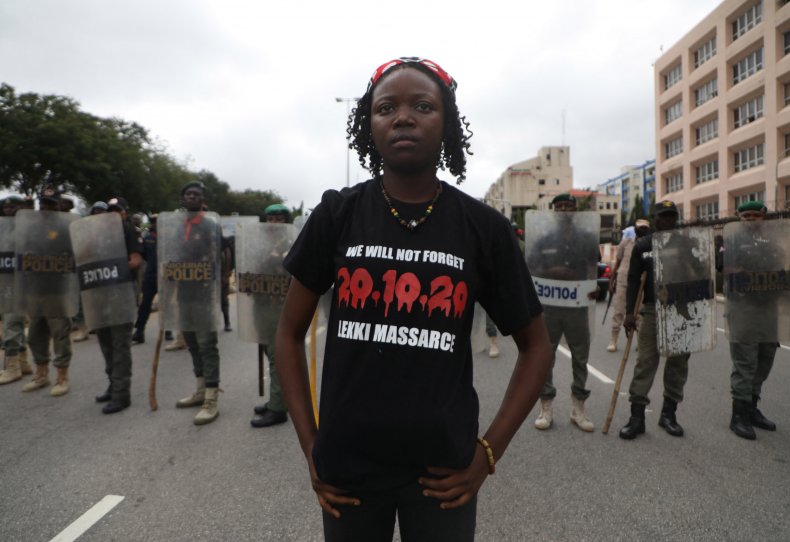A Nigerian judicial panel submitted a report to Lagos’ governor on the October 2020 shootings of peaceful protesters against police brutality at the Lekki toll gate in Lagos.
The report the panel submitted to Lagos Governor Babajide Sanwo-Olu has not been made public yet, but the Associated Press obtained a copy and confirmed details with an anonymous panel member and sources close to the panel.
The report states that police “shot at, assaulted and battered unarmed protesters, which led to injuries and deaths.” It said 11 people were killed in the shootings, while four are missing and presumed dead.
“At the Lekki toll gate, officers of the Nigerian army shot, injured and killed unarmed, helpless and defenseless protesters, without provocation or justification, while they were waving the Nigerian flag and singing the national anthem and the manner of assault and killing could in context be described as a massacre,” says the report.
The report highlights how the police refused to allow ambulances to give medical assistance to the victims. It also accuses the police of attempting to cover up the shootings.
The AP reported that the panel recommends “holistic police reforms,” including a standing committee “to deal with cases of violation of human rights by security agencies.” Sanwo-Olu said he has set up a four-member committee to work on implementing these recommendations.
A Lagos state government spokesperson did not immediately respond to the AP’s request for comment.
For more reporting from the Associated Press, see below.
Sunday Alamba, File/AP Photo
Some of those wounded at the Lekki shootings confirmed to AP the report’s descriptions of how the soldiers opened fire at the protest scene.
Nigeria saw nationwide demonstrations against police brutality last year which demanded justice for those killed and arrested by police, especially by a unit known as the Special Anti-Robbery Squad, or SARS. In response to the protests, the government has disbanded the unit. Nigerians have long complained that officials are often slow to act on charges of police brutality and many officers accused of abuses have not been disciplined.
After two weeks of the protests, on October 20 security forces were deployed to disperse the demonstrators following attacks by some hoodlums on government facilities and police stations.
In Lagos, Nigeria’s most populous city with more than 14 million people, soldiers were sent to the Lekki toll gate plaza where hundreds of protesters had gathered. After dark, hours after a 24-hour curfew was declared by the Lagos government, soldiers “shot blank and live bullets directly and pointedly into the midst of the protesters at the Lekki Toll Gate, with the deliberate intention to assault, maim and kill,” according to the report.
The shootings at the toll gate and in another part of Lagos resulted in the deaths of 12 persons, Amnesty International said after its investigations, but the Nigerian government and the army have continued to deny that anyone was killed by security forces at the toll gate.
Weeks after the protest, the Nigerian army admitted that the soldiers were deployed with live ammunition, but it denied that soldiers fired on the protesters.
Most states in Nigeria set up judicial panels to investigate allegations of police brutality, but the Lagos government expanded the scope of its commission to probe the shooting incident at the Lekki toll gate and to award compensation to those who filed charges.
The panel awarded about $1 million in compensation to 70 people who filed charges that they had been victims of police brutality in the October demonstrations. Dozens of others have filed complaints but still await justice as those petitions have not yet been considered.
“We had 42 cases left out of about 250…excluding the investigation of Lekki toll gate [shooting],” said a member of the panel, who spoke on condition of anonymity. The panel did not have time to consider the other complaints, said the panel member. “What we have done, there is no court in the world that will do it in one year.”
While much of the attention has been on Lagos, dozens of charges of brutality filed in at least nine other states had indefinitely postponed their proceedings, Amnesty International and petitioners told AP.

Photo by Kola Sulaimon/AFP via Getty Images



















